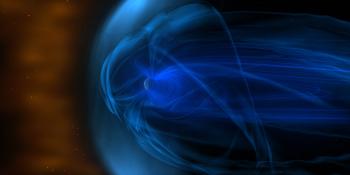Viewing archive of Monday, 26 April 2004
Solar activity report
Any mentioned solar flare in this report has a scaling factor applied by the Space Weather Prediction Center (SWPC). Because of the SWPC scaling factor, solar flares are reported as 42% smaller than for the science quality data. The scaling factor has been removed from our archived solar flare data to reflect the true physical units.
Report of Solar-Geophysical Activity 2004 Apr 26 2200 UTCPrepared by the NOAA © SWPC and processed by SpaceWeatherLive.com
Joint USAF/NOAA Report of Solar and Geophysical Activity
SDF Number 117 Issued at 2200Z on 26 Apr 2004IA. Analysis of Solar Active Regions and Activity from 25-2100Z to 26-2100Z Solar activity was low. There was only one C-class
event during the past 24 hours, a C2/Sf from Region 599 (N16E15) at
0242 UTC. Although this region emerged rapidly yesterday, the past
24 hours have see a noticeable decrease in spot area, flare
production, and overall brightness of the region. New Region 600
(N18W06) emerged on the disk today as a small beta-type sunspot
group.
IB. Solar Activity Forecast
Solar activity is expected to be
predominantly low for the next three days. There is a slight chance
for an isolated M-class event.
IIA. Geophysical Activity Summary 25-2100Z to 26-2100Z
The geomagnetic field was quiet to unsettled. Mostly quiet conditions
prevailed early in the day as solar wind signatures showed a gradual
declining trend in solar wind velocity with very weak interplanetary
magnetic field, up until around 1520 UTC. Beginning around 1520 UTC
a compression wave followed by some transient flow was observed:
density, velocity, temperature and magnetic field all increased over
a few minutes, and Bz showed a rotation over 2-3 hours from +5 to
around -7 nT. The geomagnetic field responded by an increase to
unsettled levels.
IIB. Geophysical Activity Forecast
The geomagnetic field is
expected to be predominantly unsettled for the next 24 hours (27
April). Quiet to unsettled levels are expected to prevail for the
second and third days (28-29 April).
III. Event Probabilities 27 Apr to 29 Apr
| Class M | 15% | 15% | 15% |
| Class X | 01% | 01% | 01% |
| Proton | 01% | 01% | 01% |
| PCAF | green | ||
IV. Penticton 10.7 cm Flux
Observed 26 Apr 100 Predicted 27 Apr-29 Apr 100/095/090 90 Day Mean 26 Apr 107
V. Geomagnetic A Indices
Observed Afr/Ap 25 Apr 007/012 Estimated Afr/Ap 26 Apr 007/007 Predicted Afr/Ap 27 Apr-29 Apr 010/010-005/008-005/008
VI. Geomagnetic Activity Probabilities 27 Apr to 29 Apr
| A. Middle Latitudes | |||
|---|---|---|---|
| Active | 20% | 15% | 15% |
| Minor storm | 15% | 10% | 10% |
| Major-severe storm | 10% | 05% | 05% |
| B. High Latitudes | |||
|---|---|---|---|
| Active | 25% | 20% | 20% |
| Minor storm | 20% | 15% | 15% |
| Major-severe storm | 15% | 05% | 05% |
All times in UTC
Latest news
Latest forum messages
100 year cycle-Centennial Gleissberg Cycle (CGC) 2AR4069 4Filaments and prominences 82Ask your obscure/"stupid" space weather questions. 368Fulguration events between unnumbered and numbered active regions, almost at the same time. 2
More topicsSupport SpaceWeatherLive.com!
A lot of people come to SpaceWeatherLive to follow the Sun's activity or if there is aurora to be seen, but with more traffic comes higher server costs. Consider a donation if you enjoy SpaceWeatherLive so we can keep the website online!

Space weather facts
| Last X-flare | 2025/03/28 | X1.1 |
| Last M-flare | 2025/04/22 | M1.3 |
| Last geomagnetic storm | 2025/04/21 | Kp5+ (G1) |
| Spotless days | |
|---|---|
| Last spotless day | 2022/06/08 |
| Monthly mean Sunspot Number | |
|---|---|
| March 2025 | 134.2 -20.4 |
| April 2025 | 120 -14.2 |
| Last 30 days | 111.9 -31 |


